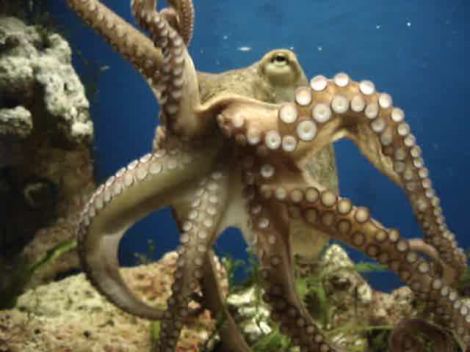(Many thanks to my friends at Languagehat.com)
My puzzlement over the hypocritical octopus and the hypocritical ocean wave in Victor Hugo’s Les Travailleurs de la Mer led me to an etymological investigation of the words hypocrite and hypocrisy (hypocrisie) in English, French, Latin, and Greek (but not Hebrew.) It was actually sort of a wild goose chase, but I put in a lot of time into it and one of the privileges of obscure bloggers is to publish anything they want. This is probably my least interesting post ever, since most people aren’t interested in etymology and the ones who are have better things to read.
The word “hypocrite” and its derivatives trace back to the Greek. Neither the word nor the concept is found in Hebrew. The word does not appear in the Septuagint, the Jews’ own Greek translation of the Tanakh (the Old Testament), though it does appear in a different Jewish translation of the Tanakh into Greek. When the word is seen in the KJV translation of the Old Testament it translates, and possibly mistranslates, a word that simply means “godless” or “lawless”. (Whether it’s a translation or a mistranslation depends on the degree to which the Biblical Greek word’s meaning had diverged from its classical Greek meaning).
In classical Greek the word “hypocrite” means someone who is pretending to be or acting as someone else. It can be negative, as in the case of a fraud, or neutral, as in the case of stage actors and public spokesmen.
The word appears many times in the Greek New Testament, often in the words of Christ. This is problematic, since Jesus did not speak Greek and there doesn’t seem to be an Aramaic or Hebrew equivalent of the word. In only one case does this word clearly have its classical Greek meaning of “pretending”; in the others (and in the exceptional Jewish translation mentioned above) the Greek word seems to have acquired an additional meaning beyond just feigning and dissimulation, something more like “evil”.
Presumably the Greek word had evolved (perhaps under the influence of Hebrew and Aramaic). Conjecturally, if “hypocrisy” in the sense of “feigning” had come to be used mostly in cases when evil people were feigning goodness, then “evil” might become part of the definition. Thus, “pretending to be good, but really evil inside” and simply “evil inside”, rather than “feigning”, might have become the primary meaning of the word. However the restricted “feigning” meaning probably never quite disappeared — Godefroy cites an instance from Old French.
It seems pretty clear that the common European meaning of the word is derived (via the Vulgate) from Biblical and not classical Greek, though some scholarly writers may have occasionally deliberately reverted to the classical meaning. One source claims that the word came to English via Molière’s play Tartuffe, ou le Hypocrite, and while this is not true and is off by many centuries, it’s possible that in English the limited Tartuffian sense became dominant while the broader meaning survived in France. Even so, Hugo’s application of the word “hypocrite” to an octopus pretending to be a rock and to the murderous ocean wave feigning innocence does seem like quite a stretch. But Hugo, being Hugo, could lay it on as thick as he wanted.
SOURCES BELOW
(more…)

